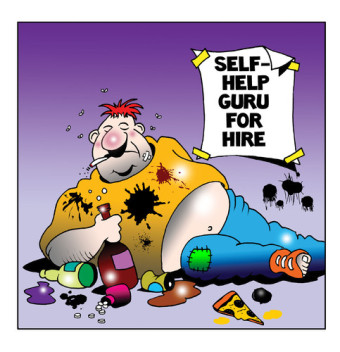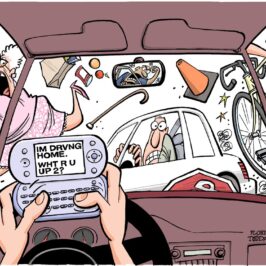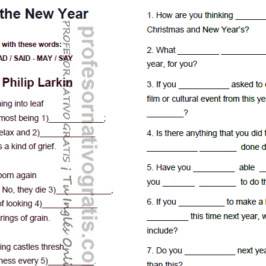
Good advice from bad people
People give advice that they completely ignore- Does that mean the advice is not worth taking? Read this article from ‘The Guardian’ and answer the questions.
Remember:
- You can listen to the text by pressing the ‘PLAY’ button at the end.
- Check the meaning or pronunciation by double-clicking any individual word .
- Use the Google translator at the top of the page to translate the whole text.
In 1991, the relationship guru Barbara deAngelis published How To Make Love All The Time, which promised to impart the secrets of making “love last a lifetime”. Soon after, John Gray released his famous manual on romantic success, Men Are From Mars, Women Are From Venus. But when the two got married, their union lasted a mere two years. Yet that slightly unsettling fact is nothing compared to the case of Ernest Garlington, a motivational speaker who wrote books extolling nonviolence – then paid a hit man to try to kill his wife’s ex-husband.
Should this surprise us? Maybe it shouldn’t. Good Advice From Bad People, a new book by Zac Bissonnette, is crammed with examples of self-help gurus and other self-styled experts proving “comically – and sometimes darkly – horrible at following their own leads”. (The subtitle is Selected Wisdom From Murderers, Stock Swindlers And Lance Armstrong.) “I never play it safe when I write a book,” said romance novelist Janet Dailey, a dispenser of life advice. And she didn’t: her riskiest technique, it turned out, was lifting passages from fellow author Nora Roberts.
Many of Bissonnette’s subjects are criminals, or mentally ill. But he touches briefly on a more fascinating possibility: what if it’s precisely because some people have big problems, in a given domain, that they end up so forcibly telling others what to do about it? In its original Freudian sense, “projection” is a woolly notion, but the contemporary psychologist Roy Baumeister suggests one way it might work. When you’re keen not to think certain thoughts about yourself, you’ll make them “chronically accessible” to your mind, so they’ll be the first things you reach for when analysing what’s wrong with others. Lance Armstrong could have settled for being a cheat; instead, he was a cheat who banged on about integrity.
The irony is that the resulting advice can be great. The best investment strategy, Bernie Madoff once said, is to resist the urge to play the system and put your money in index funds. He was right; it was investing your money with Madoff, the ultimate system-player, that was wrong. “You teach best what you most need to learn,” wrote Richard Bach, though he presumably didn’t have Ponzi schemers in mind.
Leaving aside criminals and charlatans, you could argue we’re better off taking advice from those who’ve struggled with whatever they’re addressing. It’s a cliche that “all therapists are crazy” – and there’s evidence they really do have more direct experience of mental illness than others – but that’s not necessarily bad. It means they’re personally invested. (I’m no therapist, but to the extent that this column dispenses advice, I need it as desperately as anyone, I assure you.) The difference is that, ideally, they’re honest with themselves about it. Unlike Armstrong. And also unlike the pious preacher/author Robert Schuller, who, Bissonnette explains, liked to remind his flock that “without kindness, the mighty are ruthless… without kindness, the intelligent become arrogant”. So true, as demonstrated when Schuller reportedly went “nuts” on a plane after being served grapes packaged with cheese. “I’m allergic to cheese!” he supposedly said. “I can’t even see cheese!” Prosecutors dropped assault charges in exchange for an apology and fine. Which was kind of them.
oliver.burkeman@theguardian.com
Follow Oliver on Twitter.
guardian.co.uk © Guardian News & Media Limited 2010
Published via the Guardian News Feed plugin for WordPress.
Press ‘Start’ and match the people below with the sentences:
A: Barbara de Angelis
B: Ernest Garlington
C: Janet Dailey
D: Roy Baumeister
E: Maddof
F: Therapists
G: Schuller
H: The writer of the article






Buried alive: the premature obituaries
Another great article from The Guardian! People that have been declared dead before their time-...